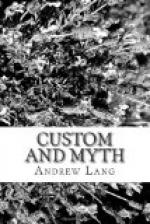Such is a summary of the evidence which shows that Aryans had once been totemists, therefore savages, and therefore, again, had probably been in a stage when women were scarce and each woman had many husbands.
Evidence from the Gens or [Greek].—There is no more puzzling topic in the history of the ancient world than the origin and nature of the community called by the Romans the gens, and by the Greeks the [Greek]. To the present writer it seems that no existing community of men, neither totem kin, nor clan, nor house community, nor gotra, precisely answers to the gens or the [Greek]. Our information about these forms of society is slight and confused. The most essential thing to notice for the moment is the fact that both in Greece and Rome the [Greek] and gens were extremely ancient, so ancient that the [Greek] was decaying in Greece when history begins, while in Rome we can distinctly see the rapid decadence and dissolution of the gens. In the Laws of the Twelve Tables, the gens is a powerful and respected corporation. In the time of Cicero the nature of the gens is a matter but dimly understood. Tacitus begins to be confused about the gentile nomenclature. In the Empire gentile law fades away. In Greece, especially at Athens, the early political reforms transferred power from the [Greek] to a purely local organisation, the Deme. The Greek of historical times did not announce his [Greek] in his name (as the Romans always did), but gave his own name, that of his father, and that of his deme. Thus we may infer that in Greek and Roman society the [Greek] and gens were dying, not growing, organisations. In very early times it is probable that foreign gentes were adopted en bloc into the Roman Commonwealth. Very probably, too, a great family, on entering the Roman bond, may have assumed, by a fiction, the character and name of a gens. But that Roman society in historical times, or that Greek society, could evolve a new gens or [Greek] in a normal natural way, seems excessively improbable.




